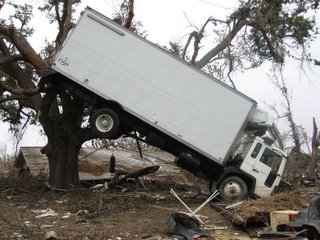Tampa Bay's local CBS affiliate, WTSP, has posted
an ad on its web site seeking Citizen Journalists.
The station will train 20 ordinary Joes and Janes to shoot video. WTSP will provide a camera and tripod for those chosen. Video may show on the air or on the station's web site with each video the station uses earning the shooter $20.
Full disclosure: I do very occasional work substituting for WTSP's morning traffic anchor. My paycheck comes from Traffic.com but I work at the station when I appear on its morning show.
But I have no inside knowledge of the reasons behind the idea. I heard of it from a
posting on a TV photographers message board that I frequent called b-roll.net, where people do not warmly welcome the idea.
I don't see it as the threat that they do, though. Their fear, not entirely unfounded considering how the TV news business has gone, is that these $20-a-story shooters will replace some of them as stations try to make up for falling ad revenue by finding cheaper ways to gather the news.
Many stations, including WTSP, have begun adding "one-man-bands," who shoot, write, edit and report stories by themselves. OMBs (called "backpack journalists" in WTSP lingo and "videojournalists" at some other places) are common at small markets. I shot my own stories for the first three years of my professional life at WMDT-TV in Salisbury, Maryland.
(Now, in a completion of the circle, I own
my own camera and shoot some of my own freelance work.)
The chief criticism of using citizen journalists is that airing the work of amateurs cheapens that produced by professionals and further blurs the line between established news outlets and any idiot who signs up for a free blog and starts typing, especially those idiots with access to still and video cameras.
One such idiot could interrupt your reading pleasure at any time with some stupid video of his cat, which he thinks is clever because the music -- first of all titled "The Year of the Cat" -- builds up to a huge crescendo (thanks, in part, to one of the guy's favorite guitar solos ever) as his cat, which has no commensurate ups and downs in its life, sits licking herself.
If that's not entertainment, there just isn't any.*
(Pause while we snap the guy out of talk-about-himself-in-third-person-land, among other faraway delusional places.)
Where was I? Oh, yes, the dilution of the news media as it invades, but may be instead invaded by, the blogosphere.
But what's a station -- or any traditional news outlet, for that matter -- to do? Their audiences are fleeing -- for the Internet, for their cell phones and for the great beyond. Until they can find a way to marry the newscast with a video game, trying to incorporate those who might be competitors at a neighborhood level into its cause might be worth trying.
WTSP's ad doesn't say whether one of its Citizen Journalists can claim to be working on its behalf when he or she shows up somewhere ready to roll. Nor does it say if the camera will be branded with the "Tampa Bay's 10" logo. That would make sense.
I suspect that one reason for this is marketing. People see someone representing Ch. 10 at some obscure town meeting, school play or little league game and get the idea that the station has a wider reach than others. Maybe they tune in to see if their event airs on TV or on the web.
Maybe the station gets video of something important that either it didn't know about or couldn't get to with its own staff.
But mostly, it sounds like a response to the threat from blogs like
Seminole Heights or
Davis Islands Today. They're both blogs dedicated to sections of Tampa. There are probably a lot more that I don't know about. Each by itself is no rival but together they continue the chipping away of local TV and newspaper audiences.
TV stations are probably safe from that guy with his cat video. For now. He may wise up someday.
*
Maybe there is. Please note that I did not shoot the cat video with my professional camera.


